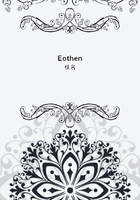
第74章
I believe that the prospect of death often brings with it strong anxieties about matters of comparatively trivial import, and certainly with me the whole energy of the mind was directed towards the one petty object of concealing my illness until the latest possible moment - until the delirious stage. I did not believe that either Mysseri or Dthemetri, who had served me so faithfully in all trials, would have deserted me (as most Europeans are wont to do)when they knew that I was stricken by plague, but I shrank from the idea of putting them to this test, and I dreaded the consternation which the knowledge of my illness would be sure to occasion.
I was very ill indeed at the moment when my dinner was served, and my soul sickened at the sight of the food; but Ihad luckily the habit of dispensing with the attendance of servants during my meal, and as soon as I was left alone Imade a melancholy calculation of the quantity of food which Ishould have eaten if I had been in my usual health, and filled my plates accordingly, and gave myself salt, and so on, as though I were going to dine. I then transferred the viands to a piece of the omnipresent Times newspaper, and hid them away in a cupboard, for it was not yet night, and Idared not throw the food into the street until darkness came.
I did not at all relish this process of fictitious dining, but at length the cloth was removed, and I gladly reclined on my divan (I would not lie down) with the "Arabian Nights" in my hand.
I had a feeling that tea would be a capital thing for me, but I would not order it until the usual hour. When at last the time came, I drank deep draughts from the fragrant cup. The effect was almost instantaneous. A plenteous sweat burst through my skin, and watered my clothes through and through.
I kept myself thickly covered. The hot tormenting weight which had been loading my brain was slowly heaved away. The fever was extinguished. I felt a new buoyancy of spirits, and an unusual activity of mind. I went into my bed under a load of thick covering, and when the morning came, and Iasked myself how I was, I found that I was thoroughly well.
I was very anxious to procure, if possible, some medical advice for Mysseri, whose illness prevented my departure.
Every one of the European practising doctors, of whom there had been many, had either died or fled. It was said, however, that there was an Englishman in the medical service of the Pasha who quietly remained at his post, but that he never engaged in private practice. I determined to try if Icould obtain assistance in this quarter. I did not venture at first, and at such a time as this, to ask him to visit a servant who was prostrate on the bed of sickness, but thinking that I might thus gain an opportunity of persuading him to attend Mysseri, I wrote a note mentioning my own affair of the sore throat, and asking for the benefit of his medical advice. He instantly followed back my messenger, and was at once shown up into my room. I entreated him to stand off, telling him fairly how deeply I was "compromised," and especially by my contact with a person actually ill and since dead of plague. The generous fellow, with a good-humoured laugh at the terrors of the contagionists, marched straight up to me, and forcibly seized my hand, and shook it with manly violence. I felt grateful indeed, and swelled with fresh pride of race because that my countryman could carry himself so nobly. He soon cured Mysseri as well as me, and all this he did from no other motives than the pleasure of doing a kindness and the delight of braving a danger.
At length the great difficulty which I had had in procuring beasts for my departure was overcome, and now, too, I was to have the new excitement of travelling on dromedaries. With two of these beasts and three camels I gladly wound my way from out of the pest-stricken city. As I passed through the streets I observed a fanatical-looking elder, who stretched forth his arms, and lifted up his voice in a speech which seemed to have some reference to me. Requiring an interpretation, I found that the man had said, "The Pasha seeks camels, and he finds them not; the Englishman says, `Let camels be brought,' and behold, there they are!"The difficulty was occasioned by the immense exertions which the Pasha was making to collect camels for military purposes.
I no sooner breathed the free, wholesome air of the Desert than I felt that a great burden which I had been scarcely conscious of bearing was lifted away from my mind. For nearly three weeks I had lived under peril of death; the peril ceased, and not till then did I know how much alarm and anxiety I had really been suffering.